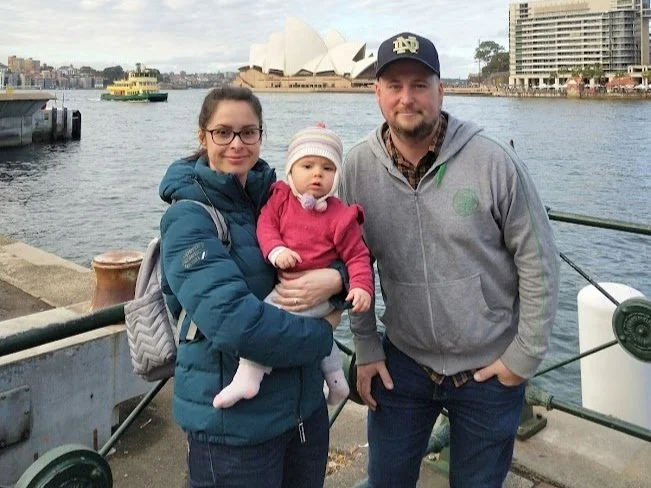Iraq After Isis
Matthew and his family traveling to meet the archbishop.
Documentary reflects serving in the face of terror
By Weam Namou
In a world often marked by division and misunderstanding, Matthew Howard, a seasoned communications professional and executive producer of Common Home TV, is on a mission to amplify the voices of those working for peace and justice. His latest documentary, Learning to Serve in the Face of Terror, is centered around Bishop Bashar Warda, Archbishop of Erbil, Iraq. It highlights the profound impact of faith in times of crisis, particularly in the face of adversity in the Middle East.
Howard is originally from Montreal, Canada. His journey to create this documentary began ten years ago while working in Melbourne, Australia, where he currently lives. When he learned that Archbishop Warda was visiting Sydney, he, his wife, and their newborn daughter packed up and drove to meet him, even facing a car breakdown along the way. “Meeting him was incredible—his presence radiates love and compassion, especially in such dark times,” Howard recalls.
The inspiration for this documentary is deeply rooted in the mission of the Redemptorists, a Roman Catholic religious order founded in 1732 by Saint Alphonsus Liguori in Scala, Italy. The order focuses on preaching the Gospel and serving the poor, particularly in areas of great need.
“Archbishop Warda embodies the Redemptorist spirituality I admire,” Howard says, emphasizing the archbishop’s dedication to marginalized communities, which reminded him of figures like Father Alec Reid, who played a crucial role in Northern Ireland’s peace process, and Brother Jun Santiago, who bravely documented the realities of extrajudicial killings.
Bishop Warda said that the history of the Redemptorists of Iraq goes back to the late 1950s, when the late Chaldean patriarch Polis Sheiko asked the Redemptorists to come spread the Good News for the marginalized and forgotten villages in northeastern Syria and then, from there, to Iraq and other places where there was a need.
“I wanted to join the Redemptorists and was told ‘no,’ they couldn’t take someone from a local seminary,” said Warda. “I was ordained as a priest in 1993, and then renewed my request, and this time, the respond was, ‘Yes, we can accept you.’”
Howard’s intention is to shed light on the often-misunderstood narrative of the Catholic Church, particularly regarding its role in promoting peace amidst turmoil. “The secular audience needs to hear the truth about the Church,” he says, underscoring the importance of storytelling in bridging gaps of understanding, although he admits that telling Archbishop Warda’s story was a delicate endeavor.
Howard likens it to producing a film about the Holocaust, where the stakes of representation are high. But Archbishop Warda’s calming presence and deep knowledge of faith principles made him a compelling figure in the narrative of resilience and hope during the rise of ISIS in Mosul.
The morning that ISIS attacked, he found himself inundated with people seeking refuge, and his instinct to respond to “everyone’s needs” illustrated his commitment to humanity, irrespective of faith.
“People walked for over 12 hours to reach safety because they were completely unprepared for what happened,” he said. “We had to respond with whatever resources we had, offering help to all in need.”
“Archbishop Warda didn’t just provide food and shelter,” said Howard. “He offered hope and the strength of faith to those who had lost everything.”
He points out that Warda’s heroic actions during the siege of Sinjar, where he defended the Yezidis, shows the universality of Catholicism. Howard notes, “His simple yet profound approach to helping others is striking, especially given the horrors he faced.”
This year marked the ten-year anniversary of the ISIS attacks, but Howard says that the story is far from over. “The trauma persists, and we must address it to prevent cycles of violence from continuing.”
As he reflects on the broader impact of trauma, he notes how the leadership of Hamas emerged from their own experiences of being terrorized. “Breaking this cycle requires better peace-making traditions,” Howard says.
Engaging in open dialogue about these issues is essential, he adds, and Archbishop Warda has invested significant effort into conversations with Islamic scholars about such matters. In the documentary, Warda talked about how, according to Islam, Yezidis, Jews, and Christians are subject to enslavement and killing because they are not people of the book (Quran).
“The blessings, if I may say, of the phenomena of ISIS, is that for the first time, it was possible for us to speak openly and directly with Islamic scholars, and the cancer within ISIS,” said Warda. “They should be honest about naming this cancerous disease and really fight it, not by war but by educating the young people about the danger of extremism within Islam.”
Bishop Warda points out that this is not just for our own safety. but out of love for “our Muslim brothers and sisters.”
Howard hopes that viewers will recognize the spiritual aspect of humanitarian work, particularly in times of crisis. “Even those who are agnostic often turn to God in these moments,” he states.
People can watch the documentary on Common Home TV, a platform dedicated to presenting impactful Catholic content that resonates with a Western audience. “It’s important to reflect the deeper traditions of faith and social justice,” Howard says, stressing that the presence of faith communities fosters genuine encounters between individuals and God.
Howard also encourages viewers to engage with Common Home TV, where they can find interviews addressing the recurring trauma faced by various communities. He shares a particularly impactful discussion with a Palestinian Christian, for example, illustrating the ongoing struggles for peace and understanding.
Meanwhile, Bishop Warda has returned to his people in Iraq, to continue to serve them and help rebuild their communities.
Learning to Serve in the Face of Terror may be viewed at commonhome.tv
www.commonhome.tv/2024/08/23/learning-to-serve-in-the-face-of-terror/

